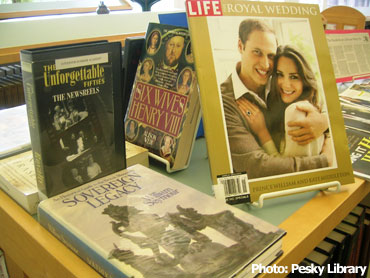Chang Mai (Mizzima) – Burmese people joined two billion people across the globe to watch the United Kingdom’s royal wedding on Friday, when Prince William of Wales and ordinary citizen Kate Middleton exchanged wedding vows in Westminster Abbey.
 Burmese people in Rangoon that Mizzima talked to said some people watched the wedding on satellite TV. One woman said there was excitement in her office, and that she guessed 70 percent of the Burmese audience would be Burmese girls with a bit of a crush on William. Some cafes in Rangoon were showing the event. But most Burmese would not have been able to watch because they did not have access to satellite TV and there was not much publicity of the event in the local media.
Burmese people in Rangoon that Mizzima talked to said some people watched the wedding on satellite TV. One woman said there was excitement in her office, and that she guessed 70 percent of the Burmese audience would be Burmese girls with a bit of a crush on William. Some cafes in Rangoon were showing the event. But most Burmese would not have been able to watch because they did not have access to satellite TV and there was not much publicity of the event in the local media.
More than a half million revellers filled the streets of London around Westminster Abbey and the Mall today to celebrate the occasion and try to get a glimpse of the royal couple. The wedding was a major media event around the world.
All eyes were on the couple, William, 28, and Kate, 29, who met while studying at St Andrews University in Scotland, and will now be known as the Duke and Duchess of Cambridge.
Around 50 foreign heads of state were among the 1,900 people on the wedding’s royal guest list.
A last minute controversy developed over some members of the guest list, however, such as Prince Mohamed bin Nawaf bin Abdulaziz of Saudi Arabia, a member of the Saudi royal family, and also ambassador to the UK. Saudi Arabia sent troops to Bahrain during the recent Bahraini government crackdown on pro-democracy protestors. At least 30 people have died so far in the suppression of protests in Bahrain.
Bahrain’s Crown Prince Salman bin Hamad Al-Khalifa decided not attend the royal wedding owing to the recent violent events in his country.
The invitation to the Syrian ambassador to the UK, Dr Sami Khiyami, was withdrawn following the deaths of hundreds of pro-democracy protestors in a violent suppression by Syrian security forces this month.
The Burmese ambassador to the UK, Nay Win, was, however, invited to the wedding ceremony, riling Burma activists in the UK.
Mark Farmener of Burma Campaign UK told the Irrawaddy website, ‘It is shameful that the royal family have invited the Burmese ambassador to the wedding. He is an ambassador for a regime which is raping ethnic women, torturing opponents, and mortar bombing civilian villages’.
Farmener was perplexed as to why the Burmese ambassador had been invited when Burma’s human rights record is so appalling, saying, ‘The Burmese regime is committing abuses far worse than the Syrian regime, and the Syrian ambassador has had his invite withdrawn’.
Britain’s relationship with the Burmese monarchy was troubled. British colonial rulers in India abolished the Burmese monarchy in 1885 after the Third Anglo-Burmese War. They claimed King Thibaw Min was a tyrant after he called on his countrymen to liberate Lower Burma from British rule. He and his family were exiled to India. The king died in 1916 at the age of 58 of a heart attack.


